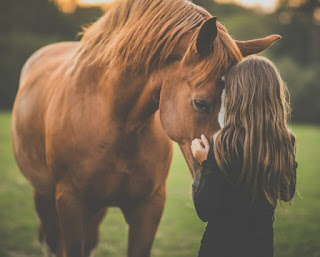What are the different Halter horse training methods?
It is vital to pick the best horse
halter to fit your horse; however, legitimate halter training is the most
effective way to guarantee that you can handle your horse regardless of the
circumstance. Training halter for horses
should be possible utilizing a rope halter or a leather halter.
At the point when you lead your horse,
he feels tension on the touchy region behind his ears. This means that horse
will push his head forward when you drag the lead rope in forward position.
Halters range from gentle to serious. At
the point when the halter material is wide, it resembles the level of
somebody's hand. In any case, assuming that the halter is sharp or tight, the
pressure is concentrated. It resembles jabbing him with a fingernail or on the
other hand more terrible.
Expecting the right fit, any halter
should feel great to your horse when it's simply lying on his head. So picking
a horse training method isn't just an issue of style.
Horse
training methods you can employ:
Train
with Care
An all-around trained horse gets how you
need him to manage next to no direction. You can utilize almost any style of
halter since you're not level enough to apply extreme tension.
Yet, assuming your horse hasn't figured
out how to provide for pressure, you must be cautious that the halter doesn't
do any injure him and make him respond.
You need your horse to push his head
ahead or down because of the pressure. In any case, that is an educated
reaction. So how will you teach him? Here are the two horse training methods to follow:
1.
Light
pressure training. One methodology is to come down on the halter just enough
that the horse moves his head however not such an excess of tension that he
believes he needs to pull back. He'll think briefly concerning how to move that
pressure to disappear, and he'll try choices. One of the choices is to drop his
head down or forward, so, all in all, you discharge the halter and recognition
him. He will not have become disturbed. He hasn't needed to do some
unacceptable thing first, and he's been compensated for speculating accurately.
2.
More
serious pressure. With a more extreme halter, once in a while called a training
halter, the horse is rejected when he settles on a terrible decision, since
pulling back is truly awkward and in some cases agonizing. A talented coach can
utilize tension on the halter to tell the horse to not go there. The mentor can
deliver the pressure on schedule, keeping the horse from banging against it.
Despite which training halter for horses you're working with, a horse ought to
never be tied until he's figured out how to provide for pressure and been
completely tried in astonishing circumstances.
You can also visit us at: https://holistichorseacademy.com/



Comments
Post a Comment